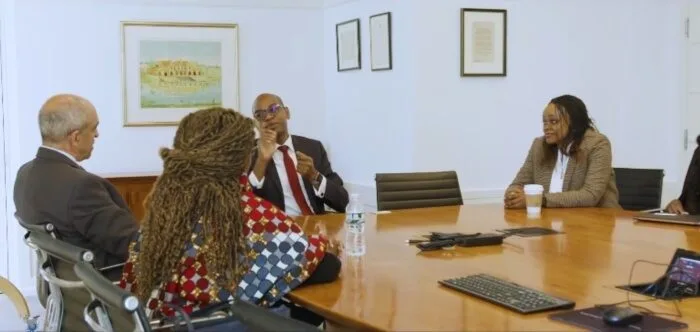Professional development and knowledge exchange are integral parts of conferences, especially for students who are in the middle of their doctoral studies. Now you might be wondering: Why do PhD students attend conferences?
PhD students attend conferences to broaden their knowledge, stay updated with the latest research, and present their own work to a wider audience. These events provide a platform for receiving constructive feedback, boosting confidence, and improving communication skills.
Additionally, conferences offer invaluable networking opportunities with global scholars, researchers, and experts, allowing students to learn about the latest research and build professional relationships. To explore these benefits in more detail, follow the rest of the article.
Significance of Conference for Graduate Students
A conference is a valuable way for graduate students to gain exposure to new ideas and research in their fields. These events provide an ideal platform to network with peers and experts, expanding their academic and professional connections. Such interactions often lead to collaborative opportunities and insights that are beneficial for their future.

One of the major career benefits of attending conferences for grad students is gaining visibility in their academic community. Presenting their work helps them receive feedback and refine their research approach. This process is crucial for their development as scholars and boosts their confidence in public speaking and presentation skills.
By engaging with the latest developments and trends, students can align their studies and research more effectively with current demands. Conferences expose them to different perspectives and methodologies, broadening their academic horizons. Ultimately, this experience strengthens their resumes and prepares them for successful careers in academia or industry.
Why Do PhD Students Attend Conferences?
PhD students find conferences invaluable when it comes to advancing their academic careers. Their participation in these events enables them to connect with the broader scientific community. Here, we explore the various reasons why PhD students are passionate about attending these gatherings:
Expanding Knowledge Base
Conferences provide an excellent platform for PhD students to learn about the latest discoveries. They can attend talks and workshops that are not accessible in their home institutions. This exposure helps them stay current with field advancements. It’s an effective way to supplement their academic knowledge.
Staying Updated with Research Trends
Taking part in conferences allows students to stay up to date on new trends and methodologies. They learn about recent studies and theoretical approaches that are shaping their discipline. This ongoing education is crucial for their research development. It ensures they remain competitive in their field.
Presenting Research Work
Students get the chance to present their findings to an audience of peers and experts, allowing them to articulate their research objectives and outcomes with clarity. To get a global recognition, many students choose global events to attend. One prime example of these events is international conference in Canada, which provides a platform to showcase their work while gaining insights from diverse perspectives. Direct feedback from experts helps refine their approach, making it easier to analyze the impact of their research in a real-world context.
Receiving Constructive Feedback
Feedback from knowledgeable attendees can guide their future research directions. It helps identify gaps in their work and offers perspectives they may not have considered. This feedback is invaluable for improving their research quality. The process also assists in preparing for future publications.
Boosting Confidence
Presenting in a public forum builds self-assurance and presentation skills. PhD students learn to communicate complex ideas more effectively. Each presentation helps them become more comfortable speaking in public. This confidence is vital for academic and professional success.
Improving Communication Skills
Conferences challenge students to explain their work to a diverse audience. They refine their ability to discuss their research clearly and concisely. These communication skills are essential in both academic and professional settings. They also help in networking effectively.
Networking Opportunities
Meeting other researchers can lead to collaborations and new research ideas. Students connect with potential mentors and peers who share similar interests. These relationships can be crucial for career development and future opportunities. Networking at conferences can open many doors.
The benefits of attending conferences for PhD students go well beyond sharing their research. They gain essential skills, build connections, and expand their knowledge, all crucial for their academic and professional success.
Types of Conferences PhD Students Should Attend
Starting on a PhD journey opens doors to a diverse world of conferences, each offering unique opportunities and experiences. These events are not just about presenting research; they’re about growth, learning, and connection. Let’s explore the types of conferences PhD students can attend.
International Conferences
They offer a broader perspective, showcasing diverse research from various cultures and countries during international conferences. These events are ideal for building international networks and understanding global trends. Additionally, they provide a platform for benchmarking one’s research against international standards.
Discipline-Specific Conferences
Focused on specific academic fields, these conferences offer a deep dive into specialized topics. They are perfect for those who seek detailed discussions and technical knowledge in their area of study. These gatherings also help in identifying niche areas of research and potential gaps. Importantly, they facilitate networking with leading experts in the specific field.
Interdisciplinary Conferences
Interdisciplinary conferences are where different fields intersect, encouraging holistic understanding and collaborative research. They’re ideal for exploring how different disciplines can inform and enhance one’s study. These forums foster innovative thinking by blending various perspectives. Such events are crucial for those looking to broaden their research scope beyond traditional boundaries.
Student-Led Conferences
Organized by students for students, these conferences offer a more relaxed environment for budding researchers. They’re a great starting point for first-time conference attendees. The atmosphere is generally supportive, focusing on learning and growth. Moreover, they provide leadership and organizational experience to those involved in their planning.
Industry Conferences
These conferences bridge the gap between academia and industry, highlighting practical applications of research. They’re essential for understanding market trends and industry needs. Attending these can open doors to potential funding and collaboration opportunities. Furthermore, they provide insights into career paths outside the academic world.
Virtual Conferences
The rise of virtual conferences has made attending events more accessible and flexible. They offer the convenience of participating from anywhere, saving time and travel costs. Despite the virtual format, these conferences still provide substantial networking and learning opportunities. They’re especially beneficial in maintaining connections and staying updated with recent developments during challenging times.
Essential Steps for PhD Students to Attend a Conference
The journey to attending conferences during PhD can be an invaluable experience for students. It’s a process that requires careful planning and preparation. Here are some essential steps for PhD students to attend a conference:
Step 1: Selecting the Right Conference
Choosing a suitable conference is the first critical step. It should align with your research interests and offer networking opportunities. Consider factors like the conference’s reputation, the quality of past events, and the profiles of keynote speakers. This choice can significantly impact the value you derive from the experience.
Step 2: Preparing Your Abstract or Paper
Once a conference is chosen, prepare your abstract or paper for submission. Ensure it’s concise, clear, and adheres to the conference’s guidelines. This document is your chance to showcase your research, so take time to refine and polish it. Feedback from peers or mentors at this stage can be invaluable.
Step 3: Securing Funding or Grants
Attending conferences can be costly, so look into funding options early. Many universities offer grants for PhD students to attend conferences. Additionally, conference organizers sometimes provide scholarships or reduced fees for students. Exploring these options can ease the financial burdens associated with travel and registration.
Step 4: Making Travel and Accommodation Arrangements
Plan your travel and accommodation well in advance. Look for budget-friendly options and consider staying near the conference venue for convenience. Early bookings often secure better deals. Additionally, connecting with other attendees can lead to shared accommodation possibilities, reducing costs.
Step 5: Networking and Participation Strategies
Develop a strategy for networking and participating in the conference. Identify key speakers and attendees you want to connect with. Prepare a short introduction about your research and be open to engaging in diverse discussions. Remember, networking is about building relationships, not just exchanging business cards.
Step 6: Presenting and Getting Feedback
Presenting your research is a crucial part of the conference experience. Practice your presentation multiple times to ensure clarity and confidence. Be open to feedback and questions from the audience, as these can provide new insights and perspectives. Use this opportunity to refine your research and presentation skills.
By following these steps, PhD students can maximize their conference experience, gaining invaluable knowledge, connections, and exposure in their academic fields.
Tips for PhD Students on Overcoming Obstacles at Conferences
Experiencing a conference as a PhD student can sometimes be challenging. However, overcoming these challenges is part of the learning and growth process. Here are some key tips for PhD students on overcoming obstacles at conferences.
Facing Networking Nerves
Networking can be intimidating, but it’s essential. Start conversations with topics related to the conference theme or a specific session. Prepare a brief introduction about yourself and your research interests. Remember, most attendees are eager to meet new people and exchange ideas.
Dealing with Presentation Anxiety
Presentation nerves are common. Practice your presentation multiple times, focusing on key points and timing. Familiarize yourself with the venue beforehand if possible. During the presentation, remember to breathe pace yourself, and engage the audience with eye contact.
Managing Time Effectively
Conferences are busy events. Plan your schedule in advance, prioritizing sessions and events you want to attend. Allow time for networking and impromptu discussions. Staying organized will help you make the most of your conference experience without feeling overwhelmed.
Engaging in Discussions
Participating in discussions can be challenging. Prepare a few questions or comments in advance for sessions you’re interested in. Listen actively to others, and when contributing, be concise and respectful. Engaging in discussions enhances your learning and visibility.
Handling Feedback Constructively
Receiving feedback is a vital part of the conference experience. Listen openly to critiques and questions about your work. Use feedback constructively to improve your research. Remember, feedback is not personal; it’s an opportunity for growth.
Adapting to Virtual Formats
Virtual conferences require a different approach. Ensure a stable internet connection and a quiet space for attending sessions. Engage actively by using chat functions and participating in virtual networking events. Virtual conferences can be less intimidating and a good way to ease into the conference scene.
FAQs About Why Do PhD Students Attend Conferences?
A PhD student’s academic journey would not be complete without attending conferences, which offer numerous benefits beyond research presentations. Here are some frequently asked questions about the importance of conferences for PhD students, along with detailed answers:
How Do Conferences Encourage Interdisciplinary Research Among PhD Students?
Often, PhD conferences feature diverse topics, promoting interdisciplinary research among students. Engaging with experts from various fields can inspire new research ideas that combine different disciplines, leading to innovative and impactful projects.
What Benefits Do PhD Students Gain from Attending Poster Sessions at Conferences?
Poster sessions provide a more informal setting for PhD students to discuss their research with attendees. This format provides in-depth discussions, immediate feedback, and networking, which can lead to further research opportunities and collaborations.
How Do Conferences Help PhD Students in Publication Efforts?
Conferences often serve as a precursor to publishing research, offering a platform to present preliminary findings. Feedback received at conferences can be used to refine papers, increasing publication chances in reputable journals.
Why is it Important for PhD Students to Stay Engaged After Conferences?
Staying engaged after conferences is crucial for maintaining the connections made during the event. Following up with new contacts and participating in discussions helps establish relationships, builds collaborations, and keeps students informed about ongoing research developments.
How Do Conferences Help PhD Students Learn About Funding Opportunities?
Many conferences feature sessions on funding opportunities for researchers. Students can gain insights into grant writing, learn about various funding agencies, and network with representatives. This will significantly increase their chances of securing financial support for their research.
Bottom Line
The journey of a Ph.D. student is immensely enriched by attending conferences, offering unparalleled opportunities for personal and professional growth. These events serve as a platform for showcasing research, learning from peers, and exploring new academic horizons.
Knowing why do PhD students attend conferences reveals the essence of these gatherings. They are not just venues for academic discourse, but pots of opportunity, fostering networks and collaboration. Here, students engage with new ideas, receive critical feedback, and build connections that shape their future paths.
These academic events are crucial in shaping the journey of a PhD student. They provide the tools, experiences, and networks necessary for managing the complexities of academia, thereby playing a pivotal role in their career development and scholarly pursuits.







